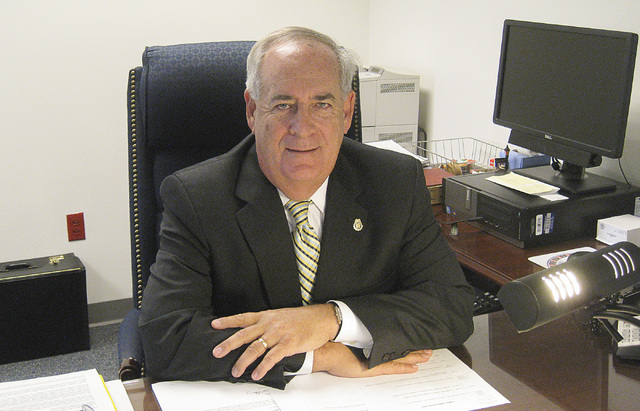New Jersey gaming chief says Vegas shows the way
ATLANTIC CITY — Struggling U.S. gaming markets must broaden their appeal or prepare to for the same fate as this troubled seaside community, New Jersey’s top gaming regular said Tuesday.
David Rebuck, director of the state’s Division of Gaming Enforcement, said Atlantic City in recent years has seen challenges “not faced anywhere else in the U.S.”
By next week, one-quarter of the city’s casinos that were open at the start of the year will be closed. A fifth, the Trump Taj Mahal, filed bankruptcy Tuesday and will close in November without creditor concessions.
Rebuck said the U.S. gaming industry has over-expanded, especially on the East Coast. Atlantic City’s gaming monopoly has been lost to new venues in Pennsylvania, Delaware, Maryland and New York.
Atlantic City gaming revenue has fell more than 60 percent since 2007.
“The industry refuses to acknowledge the market is saturated, especially in our area of the country for convenience gaming,” Rebuck said.
Gaming markets, he said, need to mirror Las Vegas, which has added non-gaming attraction and amenities. Strip resorts collect almost 65 percent of their annual revenue from non-casino sources.
Atlantic City gamblers from cities such as Philadelphia and New York have more casino choices closer to home, he noted.
Rebuck cited a June analysis by Fitch Ratings Service, which had a negative outlook for the U.S. casino industry over the next 12 to 18 months. Gaming revenue nationwide could decline 3 percent to 5 percent.
“The U.S. gaming industry has been cautioned,” Rebuck said. “Other jurisdictions are struggling and they better start doing their work now. If they don’t, they’re going to start using our business model in the future. They are going to have to look at what we are doing in Atlantic City.”
On Monday, Gov. Chris Christie convened a two-and-a-half hour meeting with gaming industry leaders and state and local elected officials to address Atlantic City’s current problems. Rebuck, a deputy attorney general for two decades, was appointed to head the gaming agency three years ago by Christie after serving a year as a senior policy advisor in the governor’s office.
Rebuck didn’t blame predecessors for ignoring the problems when the gaming dynamics in Atlantic City started to change, but instead credited Christie with tackling Atlantic City’s issues in his first year in office.
“No jurisdiction has made the efforts and taken the steps that we’ve done in last three years,” Rebuck said.
Casino regulation reform eliminated unnecessary mandates. The governor’s initiatives made the Division of Gaming Enforcement the state’s principal gaming regulatory authority.
Rebuck’s office oversaw the closures of the Atlantic Club in February, the Showboat on Aug. 31, Revel on Sept. 2 and will monitor the closing of Trump Plaza next week. Some 8,000 casino workers have lost their jobs as the market shrinks to eight casinos.
Rebuck said it was too early to know if Trump Taj Mahal will be the fifth casino to close.
“They want to keep it open, but they need certain expenditure reductions,” Rebuck said. “People saw this coming because the two Trump properties on our monthly reports were under-performing.”
Rebuck touched on a number of issues facing the division and Atlantic City in a wide ranging interview.
He said the agency is taking an extensive look at once-tainted online gaming operator PokerStars, which was bought by Canadian company Amaya Gaming Group for $4.9 billion this year. Amaya is licensed to operate online gaming in Atlantic City while PokerStars has a deal to operate online gaming with Resorts Atlantic City.
PokerStars controls 54 percent of the global online gaming traffic outside the U.S. and could be a boost to New Jersey’s Internet gaming market, which has produced $73.1 million in revenue through July, far below most projections.
However, many casino operators want to keep PokerStars on the sidelines because the company operated illegally in the U.S. after the 2006 passage of the Unlawful Internet Gambling Enforcement Act. PokerStars paid a $731 million settlement to federal prosecutors two years ago that made criminal and civil charges disappear.
Nevada has a five-year ban on companies that took wagers after 2006. New Jersey doesn’t have that restriction.
Rebuck said the division has been investigating Amaya’s buyout of PokerStars and how the management of the business has been restructured. He knows other jurisdictions, including Nevada and California, are watching to see how the state deals with PokerStars.
“We know this is an issue of great importance to industry,” Rebuck said. “(PokerStars) has been out of the U.S. for three-and-a-half years already. There is no debate on that.”
Rebuck said the division is working with Nevada gaming regulators in explore an interstate gaming compact. He said both states have both been successful in regulating Internet gaming, which in November will mark its first anniversary in New Jersey.
Earlier this year, Nevada Gov. Brian Sandoval signed a Multi-State Internet Wager Agreement with Delaware Gov. Jack Markell. Sandoval said he has spoken with Christie about the agreement and Christie confirmed Monday his talks with Sandoval.
Rebuck said the division and the Gaming Control Board are “working together” on how the agreement could be set up.
“We will continue to have a dialogue,” Rebuck said.
Contact reporter Howard Stutz at hstutz@reviewjournal.com or 702-477-3871. Follow @howardstutz on Twitter.




























